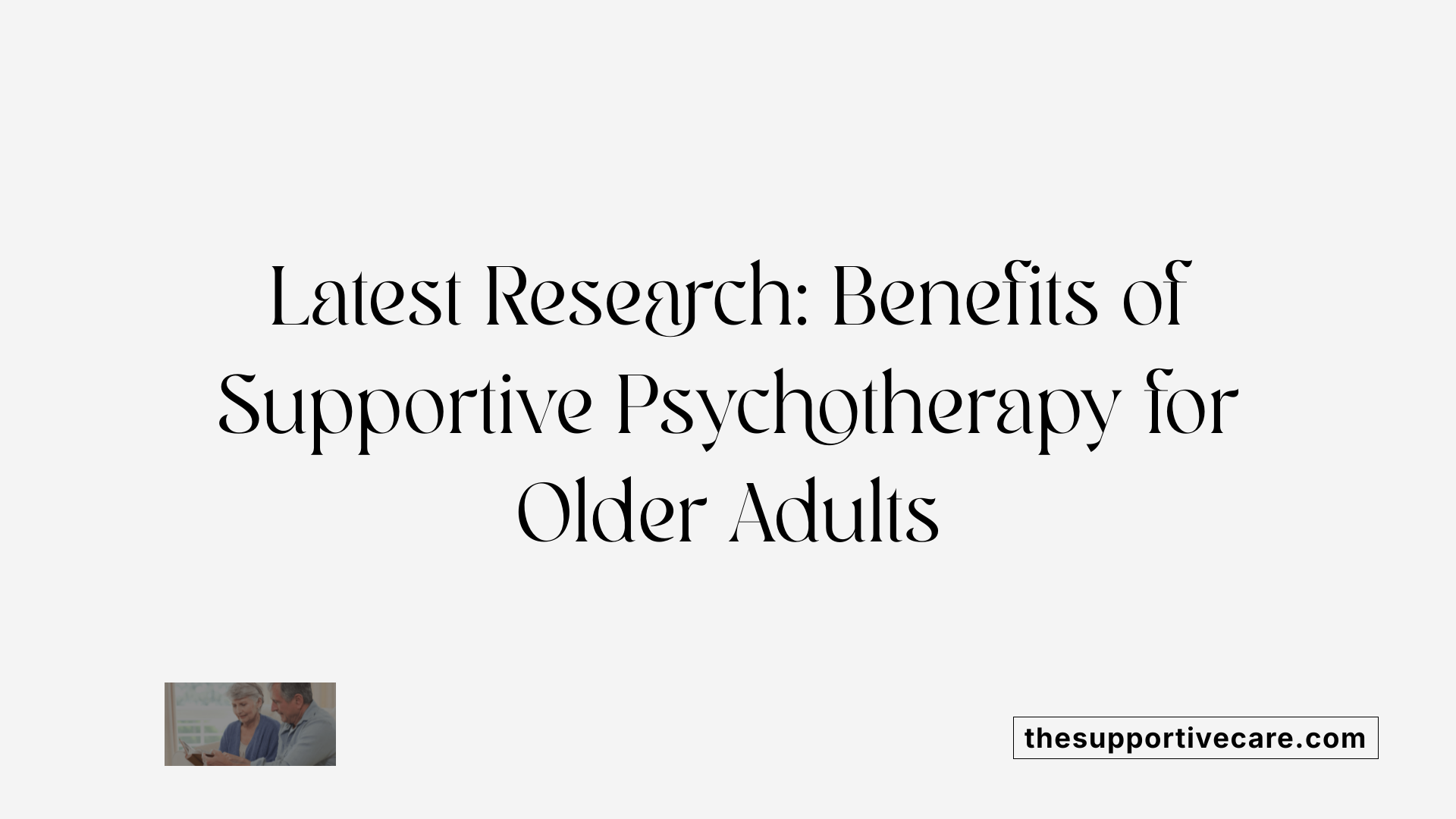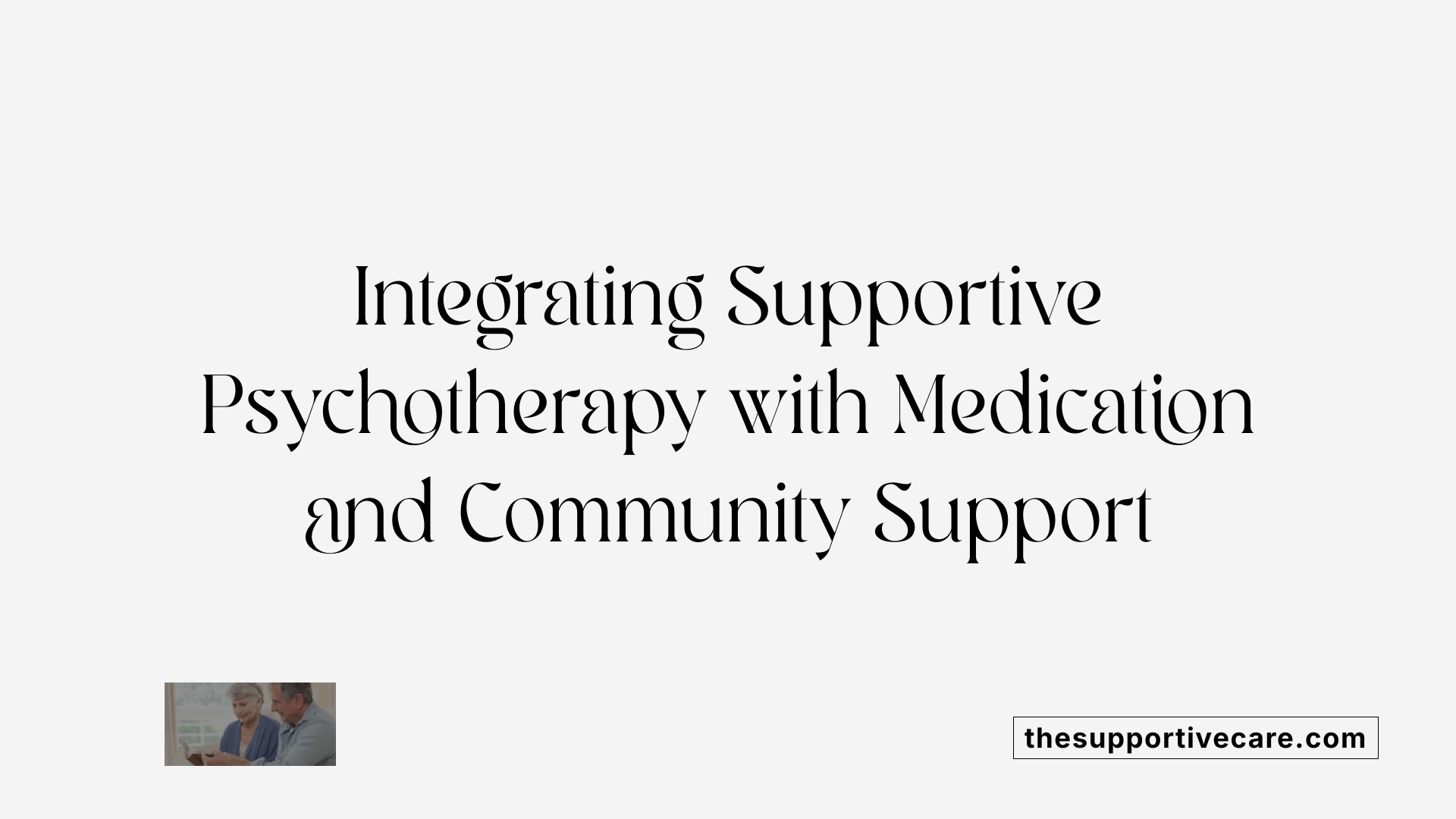Understanding Supportive Psychotherapy in the Context of Schizophrenia in Later Life
As the population of older adults grows, so does the prevalence of schizophrenia among this age group. Supportive psychotherapy emerges as a vital psychosocial intervention aiming to improve symptoms, foster stability, and enhance quality of life. This article delves into the principles, effectiveness, and clinical considerations of supportive psychotherapy tailored for older adults with schizophrenia, integrating evidence-based strategies with a comprehensive understanding of their unique needs.
What Is Supportive Psychotherapy for Schizophrenia?
What is supportive psychotherapy for schizophrenia?
Supportive psychotherapy for schizophrenia is a form of psychological treatment designed to provide emotional reassurance and practical support to individuals living with the condition. It primarily aims to help patients cope with their symptoms, maintain stability, and improve daily functioning. Unlike more structured talking therapies such as cognitive-behavioral therapy (CBT), supportive therapy focuses on building a trusting, empathetic relationship between the therapist and the patient.
Supportive therapy uses a didactic approach, emphasizing active listening, reassurance, and reinforcement of existing strengths. It also incorporates strategies to enhance coping skills, reduce distress from hallucinations or delusions, and support medication adherence. Therapists may involve family members and include activities that promote social engagement and independence.
Overall, supportive psychotherapy is a vital part of a comprehensive treatment plan, helping to improve quality of life and facilitate a better ability to manage the ongoing challenges of schizophrenia.
Core Principles and Approaches in Supportive Psychotherapy for Older Adults
Supportive psychotherapy plays a vital role in managing schizophrenia among older adults by fostering a strong therapeutic relationship and addressing both emotional and practical aspects of the illness.
A fundamental treatment approach involves establishing a trusting therapeutic alliance. This relationship encourages open communication and helps reduce feelings of distrust or paranoia often experienced by patients.
Psychoeducation is another cornerstone. It involves teaching patients about their condition, clarifying misconceptions, and promoting understanding about symptoms like hallucinations and delusions. When patients comprehend their illness better, they are more equipped to cope effectively.
Symptom management in supportive therapy focuses on reducing distress associated with symptoms, such as hallucinations or paranoia. Techniques may include distraction, reassurance, and helping patients develop coping strategies tailored to their experiences.
Improving social functioning is also targeted through interventions like social skills training, family therapy, and community engagement. These strategies aim to enhance daily living skills, social contacts, and community participation, fostering a sense of independence and connection.
The principles guiding supportive psychotherapy include emphasizing symptom relief, setting realistic goals, and respecting patient dignity through empathy and compassion. Interventions are adaptable and often integrated with pharmacological treatments to optimize outcomes.
Additionally, supportive psychotherapy is flexible, accommodating the unique needs and life circumstances of each individual. Usually delivered in short- or medium-term sessions, it provides real-time emotional support and behavioral guidance, helping patients manage their disorder more effectively.
Overall, this approach seeks to improve quality of life, stabilize symptoms, and promote functional recovery, with a patient-centered focus that respects individual social, cultural, and personal factors.
Research Evidence Supporting Supportive Psychotherapy in Older Adults

What does current research say about the effectiveness of supportive psychotherapy for older adults with schizophrenia?
Research indicates that supportive psychotherapy offers significant benefits for older adults living with schizophrenia. Studies reveal improvements in core symptoms, social functioning, self-efficacy, and overall quality of life. Supportive psychotherapy techniques—such as active listening, strength reinforcement, reassurance, and building a trusting therapeutic relationship—are central to fostering positive outcomes.
Supportive therapy is often combined with antipsychotic medications, providing a holistic treatment approach that addresses both biological and psychological needs. This combination has been linked to better symptom management and increased treatment adherence.
Evidence from multiple studies, including 24 randomized trials involving over 2,100 participants, supports the utility of supportive psychotherapy. Though the overall evidence quality is considered very low, findings suggest that supportive therapy can reduce hospitalization rates, improve mental well-being, and increase patient satisfaction.
Even in chronic cases or during acute crises, supportive psychotherapy remains a valuable treatment component. It is designed to bolster coping skills, reinforce defenses, and provide reassurance, all of which are crucial in managing longstanding mental health conditions.
While the need for more rigorous, high-quality research persists, current data affirm that supportive psychotherapy is a valid, effective, and patient-centered modality within comprehensive schizophrenia care. Its adaptable nature makes it suitable for diverse clinical settings, enhancing the therapeutic alliance and fostering better long-term outcomes in older adult populations.
Psychosocial Interventions and Support Mechanisms for Older Adults

What psychosocial interventions are suitable for older adults with schizophrenia?
Older adults living with schizophrenia can benefit from a range of psychosocial interventions tailored to their specific needs. One highly effective approach is cognitive behavioral social skills training (CBSST), which aims to improve social interactions and daily functioning. Research shows that CBSST helps patients develop better communication, problem-solving, and social competence.
Another valuable intervention is Functional Adaptation Skills Training (FAST), which focuses on enhancing everyday skills such as managing household tasks, medication adherence, and social participation. This training has demonstrated sustained improvements in daily living and social skills up to three months after completion.
Family involvement plays a crucial role, with psychoeducation programs and illness self-management strategies proven to reduce relapse rates and rehospitalizations. These programs help families understand the illness better, foster supportive environments, and improve the overall care network.
Community-based programs, such as Assertive Community Treatment (ACT), provide comprehensive, 24-hour support to those who have difficulty engaging with traditional services. ACT teams offer tailored interventions, including skills training, housing assistance, and medical care, which improve treatment adherence and reduce hospital admissions.
Supportive therapies like supportive psychotherapy serve to strengthen coping skills, instill hope, and build trust. When combined with pharmacological treatments, these psychosocial approaches optimize symptom management and functional recovery.
While many of these interventions have shown positive outcomes in the short to medium term, ongoing research is necessary to establish their long-term benefits. Implementing these strategies within a personalized, patient-centered framework can substantially improve quality of life and community integration for older adults with schizophrenia.
Clinical Considerations and Challenges in Applying Supportive Psychotherapy to Older Adults
Applying support-based psychological treatments for older adults with schizophrenia involves several important clinical considerations and challenges that require attention.
One significant factor is managing comorbidities. Older adults often experience multiple physical health conditions such as cardiovascular disease, diabetes, and mobility issues. These health problems can complicate treatment plans, necessitating coordination across healthcare providers to address both mental and physical health needs effectively.
Cognitive decline is another major challenge. Age-related cognitive impairments—such as difficulty with memory, attention, and executive functioning—may affect the patient's ability to engage fully in therapies like supportive psychotherapy. Tailoring interventions to accommodate these limitations, such as simplifying communication and incorporating cognitive-support strategies, enhances engagement and effectiveness.
Medication side effects, particularly from antipsychotics, also present concerns. Older adults are more susceptible to adverse effects like Parkinsonism, sedation, and metabolic issues. These side effects can diminish quality of life and hinder participation in psychosocial interventions. Continuous monitoring and judicious medication management are crucial.
Cultural competence plays a vital role in delivering effective support therapy. Cultural beliefs influence perceptions of illness, stigma, and treatment acceptance. Culturally sensitive approaches that respect patient backgrounds and preferences foster trust and improve engagement.
Systemic challenges, such as fragmented healthcare services and limited access to specialized mental health programs, further complicate delivery. Many older adults face social isolation and inadequate support networks, which can worsen outcomes.
Addressing these issues requires a multidisciplinary, community-oriented approach. Integrating physical healthcare, social services, and mental health treatment ensures comprehensive care.
Ongoing assessment of mental and physical health, involving family and caregivers, and using evidence-based psychosocial strategies like cognitive-behavioral social skills training and functional adaptation programs are essential. This approach helps optimize therapeutic benefits while managing the unique challenges faced by older adults with schizophrenia.
Comparative Perspectives on Supportive Psychotherapy Versus Other Treatments
Supportive therapy plays a significant role in the treatment landscape for schizophrenia, especially among older adults. It offers emotional support and helps strengthen coping mechanisms, which are crucial alongside pharmacological treatments.
When compared to other treatments like cognitive-behavioral therapy (CBT) or psychodynamic approaches, supportive therapy mainly provides a nurturing environment and reinforcement of strengths. While evidence on its effectiveness as a standalone treatment is limited, it is highly valuable as an adjunct to medication, contributing to improved adherence, reduced stress, and better therapeutic alliance.
Supportive psychotherapy is often integrated into comprehensive care plans, working together with targeted interventions to address specific symptoms and enhance overall functioning. For example, combining supportive therapy with social skills training or family interventions has shown to improve social functioning and reduce relapse.
In terms of treatment outcomes, supportive psychotherapy may not directly reduce positive symptoms like hallucinations or delusions to the same extent as CBT, but it can improve general well-being, increase insight, and promote social engagement.
It is especially useful for patients who are resistant to other forms of therapy or who have complex needs that require a flexible, patient-centered approach. Overall, evidence suggests that supportive therapy complements other treatments well, making it a vital component of comprehensive schizophrenia care in older populations.
| Treatment Type | Role in Management | Main Benefits | Evidence Level |
|---|---|---|---|
| Supportive Psychotherapy | Adjunct or component of holistic care | Emotional support, reinforcement of strengths, improved adherence | Moderate, supportive evidence |
| Cognitive Behavioral Therapy | Targeting positive symptoms and delusions | Symptom reduction, insight, coping skills | Strong evidence in specific studies |
| Psychodynamic Approaches | Underlying emotional conflicts | Insight, emotional processing | Varied, limited in older adults |
| Pharmacotherapy | Symptom control | Symptom reduction, stabilization | Well-established |
Overall, combining supportive psychotherapy with other evidence-based treatments provides a balanced, patient-centered approach that effectively addresses the complex needs of older adults with schizophrenia.
Integrating Supportive Psychotherapy into the Broader Treatment Framework
 Supportive psychotherapy plays a vital role within a multifaceted treatment approach for schizophrenia, especially in older adults. It provides emotional support, helps improve social skills, and fosters a strong therapeutic alliance, which are crucial for long-term management.
Supportive psychotherapy plays a vital role within a multifaceted treatment approach for schizophrenia, especially in older adults. It provides emotional support, helps improve social skills, and fosters a strong therapeutic alliance, which are crucial for long-term management.
In the context of multidisciplinary care, supportive therapy is often combined with pharmacological treatments, such as antipsychotics, to enhance adherence and reduce stress. It engages various healthcare professionals, including social workers, psychologists, and community mental health teams, working together to deliver holistic support tailored to each individual.
Community resources, such as outpatient clinics, support groups, and social skills training programs, complement supportive therapy by offering continuous peer support, education, and daily living assistance. Programs like Assertive Community Treatment (ACT) or Functional Adaptation Skills Training (FAST) integrate psychosocial interventions, making treatment more accessible and comprehensive.
National and regional mental health policies increasingly recognize the importance of psychosocial supports. They promote integrating supportive psychotherapy into standard care protocols, emphasizing early intervention, ongoing community engagement, and caregiver support.
How does supportive psychotherapy compare with other treatment options for schizophrenia in older adults?
Supportive psychotherapy offers psychosocial benefits that enhance social functioning, insight, and self-esteem. It is often combined with medications to foster adherence and reduce stress. While its standalone effects can vary, its strength lies in complementing other therapies like cognitive-behavioral therapy (CBT) or psychodynamic approaches.
Evidence suggests that integrating supportive therapy with targeted psychosocial techniques can improve positive symptoms, social navigation, and overall life quality. Overall, it remains a fundamental component of a comprehensive, patient-centered care plan for older adults with schizophrenia.
Emphasizing collaboration among healthcare providers and leveraging community resources ensures that supportive psychotherapy contributes effectively to the holistic management of schizophrenia, addressing individual needs within the complexities of aging and mental health.
Role of Caregivers and Support Systems in Supporting Older Adults with Schizophrenia
Caring for older adults with schizophrenia places substantial demands on family members and support networks. Caregiver burden is a significant concern, often stemming from managing complex symptoms, medication side effects, and behavioral challenges. These caregivers may experience emotional stress, physical exhaustion, and social isolation, which can compromise their wellbeing and the quality of support they provide.
Psychoeducation approaches are vital in empowering families and caregivers. These programs offer information about schizophrenia, symptom management, medication adherence, and how to handle crises or acute episodes. Understanding the illness helps reduce stigma, improves communication, and encourages supportive behaviors. Programs like the American Psychological Association’s Family Caregivers Briefcase provide accessible resources, strategies, and assessment tools to assist caregivers.
Respite care offers essential relief for caregivers, providing short-term relief through professional caregiving services or community programs. Respite options include in-home support, adult day centers, or temporary residential care, which help prevent burnout and maintain caregiver mental health.
Family involvement is crucial in treatment planning and ongoing support. When families participate in therapy sessions, psychoeducation, and support groups, they become a part of the therapeutic process, which enhances stability and recovery. Family interventions can also address maladaptive dynamics, improve communication, and foster a more supportive environment.
Applying support-based psychological treatments for older adults with schizophrenia involves several clinical considerations and challenges. Key challenges include managing comorbid physical health conditions, cognitive decline, and medication side effects—especially given the limited efficacy and higher adverse event rates of atypical antipsychotics in this population. Tailoring psychosocial interventions, such as cognitive-behavioral social skills training and functional adaptation programs, requires adapting to cognitive and physical limitations while ensuring cultural competence and engagement. Additionally, systemic barriers like fragmented services, inadequate access, and social isolation complicate implementation; thus, a multidisciplinary, community-based approach is essential. Ongoing monitoring for medication tolerability, addressing social determinants, and integrating physical and mental health care are critical to optimize outcomes and address the unique challenges faced by older adults with schizophrenia.
In summary, supporting older adults with schizophrenia necessitates a comprehensive network of caregiving, education, and community resources. Achieving a balance that alleviates caregiver stress while promoting patient independence and wellbeing remains an ongoing goal in mental health care for aging populations.
Conclusion and Future Directions
 Research on supportive psychotherapy for older adults with schizophrenia needs to expand, focusing on large-scale, high-quality studies to better understand its effectiveness compared to other interventions. Current evidence, often limited and of low quality, underscores the necessity for systematic investigations into how supportive therapy can be optimized for this age group.
Research on supportive psychotherapy for older adults with schizophrenia needs to expand, focusing on large-scale, high-quality studies to better understand its effectiveness compared to other interventions. Current evidence, often limited and of low quality, underscores the necessity for systematic investigations into how supportive therapy can be optimized for this age group.
Policy implications also play a crucial role. Governments and health organizations should prioritize funding and developing specialized programs that incorporate psychosocial interventions like supportive therapy. These programs should be accessible, culturally sensitive, and tailored to meet the unique needs of older adults, especially considering the expected rise in prevalence.
In clinical practice, integrating supportive therapy within comprehensive, person-centered care models can improve patient outcomes. Training clinicians in communication strategies that foster trust and understanding is essential. Emphasizing ongoing evaluation and adaptation of therapeutic approaches according to patients’ evolving needs will enhance treatment efficacy.
Overall, future efforts should aim at building a robust evidence base, influencing supportive policy frameworks, and refining clinical techniques to better serve older adults with schizophrenia. This holistic approach can contribute to improved quality of life and functional independence for this growing patient population.
Synthesizing Supportive Therapy in Older Adults with Schizophrenia
Supportive psychotherapy remains a cornerstone psychosocial intervention for older adults living with schizophrenia. Its strengths lie in fostering a strong therapeutic alliance, providing emotional and practical support, and integrating into multidisciplinary care plans tailored to the complex needs of this population. While current evidence underscores its benefits in improving symptoms and functioning, there remains a pressing need for further high-quality research to delineate long-term effects and comparative efficacy. Policy initiatives should promote broader access to psychosocial supports and caregiver involvement, optimizing outcomes for aging patients. As the mental health landscape evolves, adaptive, evidence-based, and culturally competent supportive therapies will be critical in enhancing the quality of life for older adults facing the challenges of schizophrenia.
References
- Special Report: Psychotherapy for Patients With Schizophrenia—A ...
- Schizophrenia in Later Life: Patient Characteristics and Treatment ...
- [PDF] Older Adults with Schizophrenia and Their Caregivers
- Treatment - Schizophrenia - NHS
- Supportive Psychotherapy: An Underappreciated Yet Effective ...
- Psychosocial Interventions for Adults With Schizophrenia
- Problem-Solving Therapy and Supportive Therapy in Older Adults ...
- Supportive therapy for schizophrenia - Cochrane


































































































